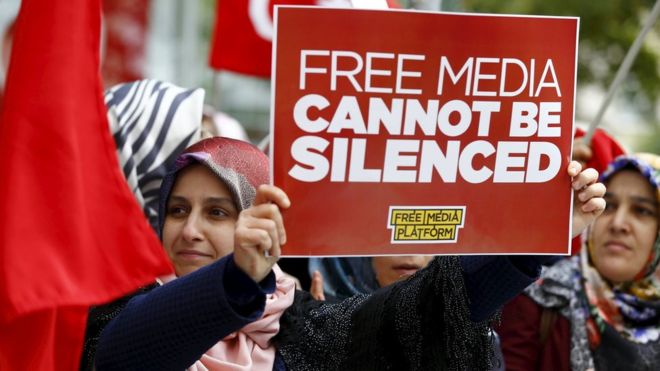ANKARA: A December 29 report from Expression Interrupted highlights Turkey’s repeated violations of Article 10 of the European Convention on Human Rights, to which it is a signatory party, and its failure to comply with rulings handed down by the European Court of Human Rights (ECtHR).
Of all 47 members of the Council of Europe, Turkey has the most violations of freedom of expression under Article 10 of the Convention. Of the 845 judgments ECtHR delivered between 1959 and 2019, 356 were against Turkey — almost five times as many as against the distant runner-up, Russia.
Turkey also tops the list of rights violations pertaining to all articles of the Constitution. “Between 1959 and 2019, 3,645 of the 22,535 judgments delivered by the Court were against Turkey, making it the country against which the ECtHR has delivered the most judgments,” the report reads. Out of 5,231 cases currently pending execution by signatory parties, 689 of them are against Turkey.
The report also noted: “One of the most important reasons for these huge numbers is non-implementation of the previous judgments of the ECtHR, which sets the stage for repetition of similar violations in the future,” and emphasized that broad interpretation of acts including “insulting the president” or “denigrating the Turkish nation/state” have been used as a basis for arrests and convictions, in violation of ECtHR rulings.
The jailed Kurdish politician and former co-chair of Turkey’s Peoples’ Democratic Party (HDP), Selahattin Demirtas, and philanthropist and businessperson Osman Kavala, are two of the highest-profile prisoners in the country, despite rulings from the ECtHR calling for their immediate release. The report suggests that their continued imprisonment is designed “to punish and discourage the exercise of freedom of expression.”
“The speed with which Turkish authorities implement judgments such as those regarding Kavala and Demirtas show what kind of commitment Turkey has to the founding values of the Council of Europe and the European Convention on Human Rights,” Massimo Frigo, senior international lawyer at the International Commission of Jurists (ICJ), told Arab News.
Last week, the Parliamentary Assembly of the Council of Europe (PACE) once again urged Ankara to comply with the ECtHR’s ruling that Demirtas should be released immediately.
Turkey is one of the founding members of the Council of Europe and ratified the European Convention on Human Rights in 1954. “Under Article 46 of the Convention, Turkey is bound to implement the judgments of the European Court of Human Rights at a domestic level,” human rights lawyer Beril Morel told Arab News.
According to Morel, Turkey has a particularly poor track record when it comes to the implementation of judgments rendered on politically sensitive cases. “The refusal of Ankara to recognize the violations in Demirtaş’ and Kavala’s cases are a recent example,” she said.
Morel cited “the actions of security forces; the lawfulness of detention; domestic violence; freedom of thought, conscience and religion; freedom of expression and information; and freedom of assembly and association” as the topics likely to “top the ECtHR agenda concerning Turkey.”
“Turkey amended its Constitution to recognize the supremacy of international law over its domestic law. Article 90 of the Constitution expressly provides that international conventions concerning human rights, ECtHR being one of these, prevail over domestic law in case of a conflict between those,” Morel said. Therefore, Turkey should implement the ECtHR’s judgements. However, she pointed out, the ECtHR can only intervene in the domestic implementation of its rulings by member states if the matter is brought to its attention with a second application and a violation of Article 46 of the Convention is found.
“We are leaving 2020 behind with a heavy heart. Turkey’s human rights and rule-of-law crisis has deepened further,” Ayse Bingol Demir, a human rights lawyer and co-director of the Turkey Human Rights Litigation Support Project, told Arab News.
According to Demir, the ongoing detention of Kavala and Demirtas — despite ECtHR rulings — will be an important feature of the Council of Europe Committee of Ministers’ agenda in 2021.
“Turkey will likely face increasing pressure and sharper decisions from the Committee,” she said. “As it did in the case of Kavala in 2020, I expect the Committee to conclude that the ongoing detention of Demirtas constitutes a continued violation of the European Court’s rulings,” she said.
“The Committee will also focus on arbitrary and unlawful detentions; the frequent use of anti-terror legislation to target the legitimate activities of human rights defenders and opposition politicians; and the lack of independence and impartiality of the judiciary,” she continued. “If the ruling government decides to insist on its current policy of denial, 2021 will certainly be a more difficult year in its relations with the Council of Europe.”
Source: Arab News



